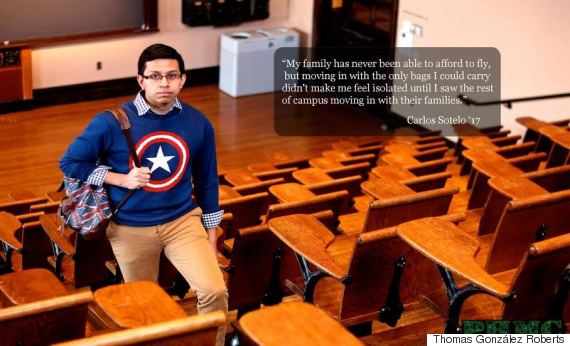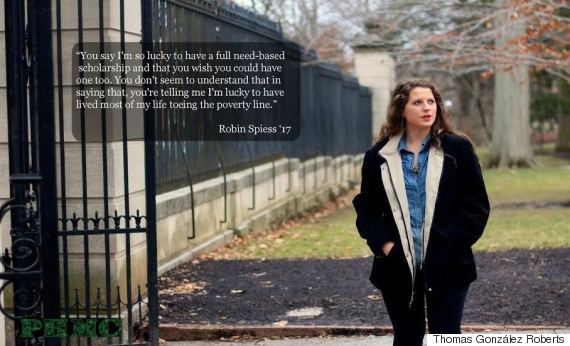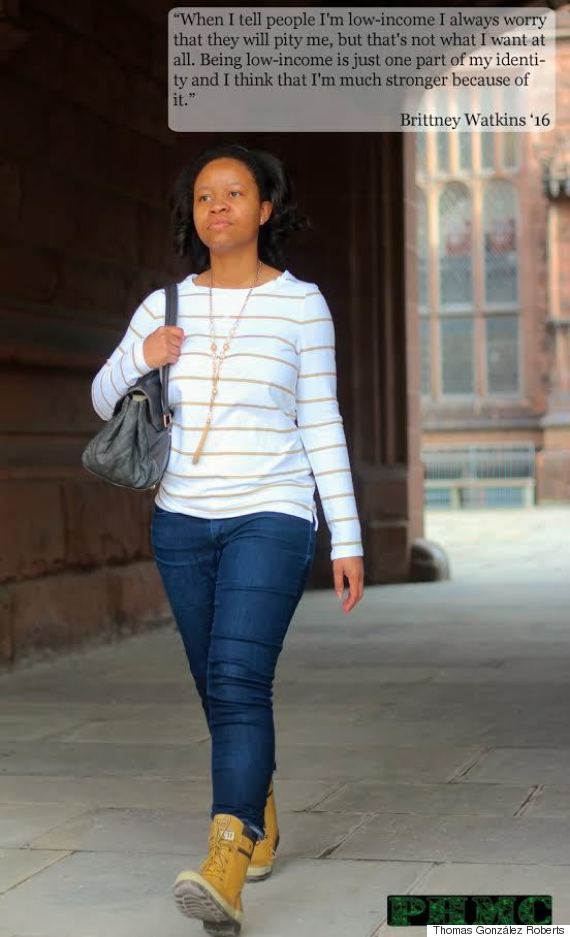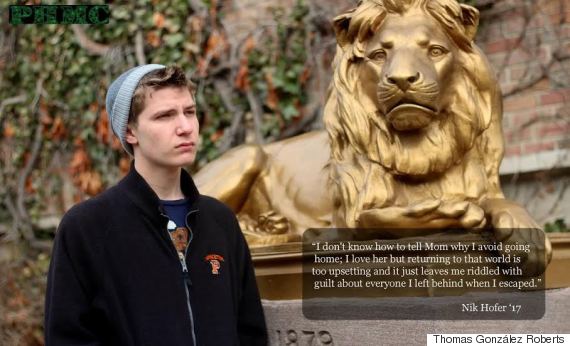There were rats in my house as I was growing up -- inordinately large and nesting in the walls. I slept on a mattress on the floor and I would wrap myself tight in my blanket every night, knowing that if I let the blanket slip the rats would climb up onto my pillow and nibble at my face. Waking to a rat in my bed with its determined teeth biting and ripping at my flesh had become my living nightmare. There was no money for an exterminator, but there were dozens of rat traps in the kitchen, all coated in peanut butter and set out on the floor, and as soon as we'd turn off the lights they'd start going off -- just popping and snapping to the tune of some sick symphony. I'd listen and I'd wrap up and I'd count snaps until I fell asleep.
"Here's a chart for all of you to see where you fall in the American economic class system. You're all so much better off than the majority of the country: here's just a little reminder."
Hurricanes were so common that it was hard to take this one seriously, even given my father's grim face and my entire family's push to evacuate. From our safe haven in Houston, Texas, my parents and I watched on six different channels as our city so near to New Orleans was berated by the water and wind of that now-infamous Hurricane Katrina. When we finally did return home months later, it was to a house so moldy and ransacked as to hardly be recognizable. The battle with insurance for compensation began; we determined to rebuild, but couldn't find the money to do so. We moved into the FEMA trailer in 2005, and would not move out of that sardine-can of a home until three long years had passed.
"So we get that the Affordable Care Act covers those poor people who had Medicare and Medicaid before, but like, how does it affect us?"

My brother had juvenile diabetes and his body was rejecting the insulin. He was in and out of the hospital constantly, and I lived beside him in those hospital beds as he lay struggling with sickness or deep in a coma. We didn't have the money to pay for it; as the medical bills piled up so did the tensions at home, and fight after fight was had over our finances. My brother was told that his body would not be able to handle much more abuse, that he'd be on dialysis by the age of 17. He told me he was the reason we never had any money, and that his medical bills were getting to be more than we could ever repay. He committed suicide. My parents went bankrupt. I was eight years old.
"You're so lucky to have a full scholarship, I wish my parents didn't have to pay anything either."

I cried the day I found out I'd be going to Princeton University; it was in many ways the happiest day of my life. I read the congratulatory email and was overcome with a wave of elated relief: I'd not only been accepted to an Ivy League college, but there in a single email I'd been handed the financial means to meet the economic burden that the idea of college tuition had placed on my shoulders. It was better than winning the lottery -- it was winning a future of opportunity that so many had always considered closed to me and those like me. I'll never forget that day. I'll never stop being grateful to this university for all it has given me.
"I mean, I came to Princeton because I guess it made sense -- my dad went here and all -- but seriously, I wish I'd just gone to a party school."
I applied to Princeton through QuestBridge, a program dedicated to connecting low-income and high-achieving students with elite universities by waiving the application fees to its 33 partner colleges and allowing students to apply to eight of those colleges early action via a single, if lengthy, application. I met my fellow QuestBridge scholars at the end of my first week of college, and was introduced to the LEDA scholars -- whose backgrounds were also similar to my own -- on campus shortly thereafter. There's a certain level of understanding, when all of us gather together and notice one another as QuestBridge or LEDA scholars. There is a mutual respect there, an understanding of separate but equally challenging struggles that have shaped every single one of us. It is this sense of community that gave rise to the Princeton Hidden Minority Council, an organization dedicated to opening dialogue about the situations of low-income and first-generation students on this and other elite college campuses. And it was this organization that pioneered the "Thoughts" campaign, which featured council members discussing the struggles they face on campus every day of their lives due to their unique positions among the lowest rungs of campus' socioeconomic ladder. The pictures were released and flooded social media outlets: many fellow students expressed awe, while others expressed confusion at why the campaign had been launched at all.
"You're low-income? I just had no idea."

People ask why the council has chosen to do this campaign. Why we students have chosen to bring attention to ourselves. And to put it quite simply, we could keep quiet; our financial situations are not that incredibly difficult to hide, honestly, even given the need to turn down our friends' common and casual suggestions to eat at expensive restaurants or to take impromptu trips that cost more money than we can spare or than we have in the bank. But this really isn't just a matter of money. It's a matter of culture and of experiences that have shaped us all -- and to shy away from talk of finances is to shy away from talk of some of the most defining elements of our lives.
"Go up there and be everything you are -- I know you'll be a success. Just try not to forget about all of us, you know? Try not to forget all of us back here, when you go."

I've written my experiences; I've written my life. But my experiences and my life join the throngs of those who have been raised in similarly disadvantaged homes; of those who have experienced the similar thrill of being accepted to an elite university and the buoyant elation of receiving similarly overwhelming financial aid; of those who have arrived on their college campuses and been confronted with an internal struggle in the face of assumed privilege and casual wealth.
When we allow ourselves to treat the topic of money as taboo, as it is so often treated on this and other elite campuses, we force ourselves to bury those parts of our lives that could make others uncomfortable -- but those parts of our lives are often the most defining of our characters and our motivations. To ignore them is impossible, but more than that, to even attempt to discount the obstacles we've faced due to our impoverished pasts is in its own way an insult to those who helped us on our way to success. It is to attempt to forget the very reasons we are here on this campus in the first place.
And I refuse to forget.
None of us will ever forget.
